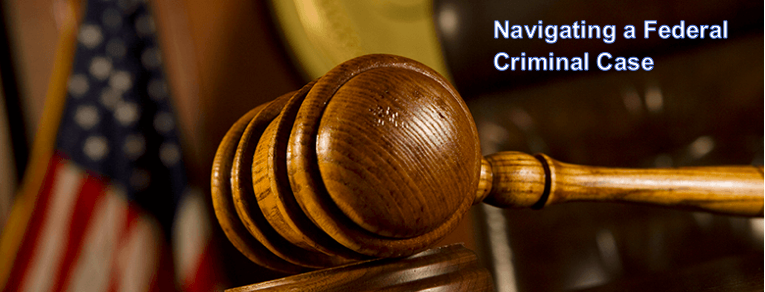Navigating a federal criminal case can be daunting. Most individuals are unsure of what lies ahead — not just the ultimate result, but also the various stages that are a part of the process. An experienced NJ federal criminal defense attorney is essential to understanding this complex procedure. Below, you will find the order of events described briefly.
1) Investigation: During the investigation, essential information is collected by the government. The investigation can sometimes include a search warrant or subpoenas for records, depending on the specific facts being investigated.
2) Charging: Following the examination of the evidence, an Assistant United States Attorney—the federal prosecutor—will decide if the case should be brought to a grand jury. You will receive a formal notice that it is believed that you may have committed a crime, listing the potential charge(s) against you.
3) Initial Hearing/ Arraignment: Shortly after you are charged, you will be brought before a magistrate judge for an initial hearing of your case. Here, you will learn about your rights and charges. The judge will also decide if you will be held in jail or released until trial.
4) Discovery: This is the phase before the case is heard. A lot of essential work occurs in this stage. The work includes gathering all of the facts about the crime and yourself so that you can put your best self forward to the court. Witnesses will be interviewed, evidence will be re-examined, and a trial strategy will be developed.
5) Plea Bargaining: Very often, the government offers the defendant a plea deal to avoid trial and reduce the defendant’s exposure to a lengthier sentence. If you accept the plea deal, you will plead guilty in open court and agree to be sentenced by a judge.
6) Pre-Trial Motions: The prosecution or defendant files these applications, which are a request for the court to make a decision on certain issues before a trial begins. Motions can affect the courtroom, trial, evidence, or testimony.
7) Trial: The trial is conducted. The United States Attorney first puts forward their case, and then the defense puts on theirs. Evidence and witnesses are both presented to the court, and ultimately the jury decides whether or not the defendant is guilty beyond a reasonable doubt.
8) Sentencing: When a defendant is found guilty or pleads guilty, the judge receives guidance from many sources in order to sentence the defendant.
9) Appeal: If you are found guilty, you may still appeal the result of your case or the sentence you received. The type of appeal depends on the specifics of the case.
If you are beginning a federal criminal case, call the attorneys at Schwartz & Posnock today! Our firm has handled Federal and State white collar and general criminal cases throughout the Federal Courts of New Jersey, located in Newark, Trenton, and Camden, as well as the Superior Courts throughout the State of New Jersey, for over thirty years. We have a proven track record of excellent results for our clients. Please contact us in any one of our convenient locations, including our Monmouth County office, located in Eatontown (at the Jersey Shore), our Essex County office, located in Livingston, our Union County office, located in Linden, or our Middlesex County office, located in East Brunswick, to discuss your case. You may call the experienced criminal defense attorneys of Schwartz & Posnock at 732-544-1460 or email us at info@schwartzposnock.com.

